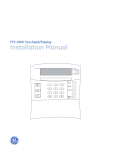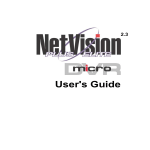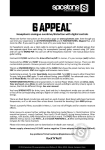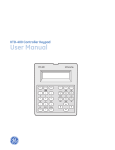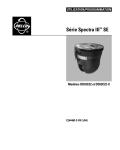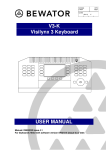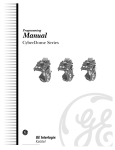Download Installation Manual - Surveillance
Transcript
KTD-313 Data Converter Installation Manual Copyright Disclaimer Trademarks and patents Copyright © 2006, GE Security Inc. All rights reserved. This document may not be copied or otherwise reproduced, in whole or in part, except as specifically permitted under US and international copyright law, without the prior written consent from GE. Document number/ 1037145D (May 2006). THE INFORMATION IN THIS DOCUMENT IS SUBJECT TO CHANGE WITHOUT NOTICE. GE ASSUMES NO RESPONSIBILITY FOR INACCURACIES OR OMISSIONS AND SPECIFICALLY DISCLAIMS ANY LIABILITIES, LOSSES, OR RISKS, PERSONAL OR OTHERWISE, INCURRED AS A CONSEQUENCE, DIRECTLY OR INDIRECTLY, OF THE USE OR APPLICATION OF ANY OF THE CONTENTS OF THIS DOCUMENT. FOR THE LATEST DOCUMENTATION, CONTACT YOUR LOCAL SUPPLIER OR VISIT US ONLINE AT WWW.GESECURITY.COM. This publication may contain examples of screen captures and reports used in daily operations. Examples may include fictitious names of individuals and companies. Any similarity to names and addresses of actual businesses or persons is entirely coincidental. GE and the GE monogram are registered trademarks of General Electric. Other trade names used in this document may be trademarks or registered trademarks of the manufacturers or vendors of the respective products. Intended use Use this product only for the purpose it was designed for; refer to the data sheet and user documentation. For the latest product information, contact your local supplier or visit us online at www.gesecurity.com. FCC compliance This equipment has been tested and found to comply with the limits for a Class A digital device, pursuant to part 15 of the FCC Rules. These limits are designed to provide reasonable protection against harmful interference when the equipment is operated in a commercial environment. This equipment generates, uses, and can radiate radio frequency energy and, if not installed and used in accordance with the instruction manual, may cause harmful interference to radio communications. You are cautioned that any changes or modifications not expressly approved by the party responsible for compliance could void the user's authority to operate the equipment. 1 Contents Preface . . . . . . . . . . . . . . . . . . . . . . . . . . . . . . . . . . . . . . . . . . . . . . . . . . . . . . . . . . . . . . . . . . . . . . . . . . . . . 1 Conventions used in this document. . . . . . . . . . . . . . . . . . . . . . . . . . . . . . . . . . . . . . . . . . . . . . . . . . . . . . . . . . . . . . . . . . . . . . . .1 Safety terms and symbols . . . . . . . . . . . . . . . . . . . . . . . . . . . . . . . . . . . . . . . . . . . . . . . . . . . . . . . . . . . . . . . . . . . . . . . . . . . . . . . .1 Product overview . . . . . . . . . . . . . . . . . . . . . . . . . . . . . . . . . . . . . . . . . . . . . . . . . . . . . . . . . . . . . . . . . . . . 2 Installation . . . . . . . . . . . . . . . . . . . . . . . . . . . . . . . . . . . . . . . . . . . . . . . . . . . . . . . . . . . . . . . . . . . . . . . . . 3 Mounting the unit. . . . . . . . . . . . . . . . . . . . . . . . . . . . . . . . . . . . . . . . . . . . . . . . . . . . . . . . . . . . . . . . . . . . . . . . . . . . . . . . . . . . . . . . .3 Wiring and DIP switches. . . . . . . . . . . . . . . . . . . . . . . . . . . . . . . . . . . . . . . . . . . . . . . . . . . . . . . . . . . . . . 4 Wiring connections . . . . . . . . . . . . . . . . . . . . . . . . . . . . . . . . . . . . . . . . . . . . . . . . . . . . . . . . . . . . . . . . . . . . . . . . . . . . . . . . . . . . . . .5 DIP switch settings . . . . . . . . . . . . . . . . . . . . . . . . . . . . . . . . . . . . . . . . . . . . . . . . . . . . . . . . . . . . . . . . . . . . . . . . . . . . . . . . . . . . . . .6 Connections for AD Manchester in, Digiplex out . . . . . . . . . . . . . . . . . . . . . . . . . . . . . . . . . . . . . . . . . . . . . . . . . . . . . . . . . . . .7 Connections for Digiplex in, AD Manchester out . . . . . . . . . . . . . . . . . . . . . . . . . . . . . . . . . . . . . . . . . . . . . . . . . . . . . . . . . . . .9 Operating the unit . . . . . . . . . . . . . . . . . . . . . . . . . . . . . . . . . . . . . . . . . . . . . . . . . . . . . . . . . . . . . . . . . . 10 AD Manchester in, Digiplex out . . . . . . . . . . . . . . . . . . . . . . . . . . . . . . . . . . . . . . . . . . . . . . . . . . . . . . . . . . . . . . . . . . . . . . . . . . 10 Digiplex in, AD Manchester out . . . . . . . . . . . . . . . . . . . . . . . . . . . . . . . . . . . . . . . . . . . . . . . . . . . . . . . . . . . . . . . . . . . . . . . . . . 11 Ultrak in, Digiplex out . . . . . . . . . . . . . . . . . . . . . . . . . . . . . . . . . . . . . . . . . . . . . . . . . . . . . . . . . . . . . . . . . . . . . . . . . . . . . . . . . . . 12 Digiplex in, Ultrak out . . . . . . . . . . . . . . . . . . . . . . . . . . . . . . . . . . . . . . . . . . . . . . . . . . . . . . . . . . . . . . . . . . . . . . . . . . . . . . . . . . . 13 VCL in, Digiplex out . . . . . . . . . . . . . . . . . . . . . . . . . . . . . . . . . . . . . . . . . . . . . . . . . . . . . . . . . . . . . . . . . . . . . . . . . . . . . . . . . . . . . 14 Digiplex in, VCL out . . . . . . . . . . . . . . . . . . . . . . . . . . . . . . . . . . . . . . . . . . . . . . . . . . . . . . . . . . . . . . . . . . . . . . . . . . . . . . . . . . . . . 15 Pelco-D/P in, Digiplex out . . . . . . . . . . . . . . . . . . . . . . . . . . . . . . . . . . . . . . . . . . . . . . . . . . . . . . . . . . . . . . . . . . . . . . . . . . . . . . . 16 Digiplex in, Pelco-D/P out . . . . . . . . . . . . . . . . . . . . . . . . . . . . . . . . . . . . . . . . . . . . . . . . . . . . . . . . . . . . . . . . . . . . . . . . . . . . . . . 17 Contacting technical support . . . . . . . . . . . . . . . . . . . . . . . . . . . . . . . . . . . . . . . . . . . . . . . . . . . . . . . . 18 Online publication library . . . . . . . . . . . . . . . . . . . . . . . . . . . . . . . . . . . . . . . . . . . . . . . . . . . . . . . . . . . . . . . . . . . . . . . . . . . . . . . 18 2 KTD-313 Data Converter Installation Manual 1 Preface This is the GE KTD-313 Data Converter Installation Manual. This document includes an overview of the product and detailed instructions explaining: • • • how to install and wire the KTD-313; how to configure the KTD-313 to work with various third-party hardware; and how to operate the KTD-313. There is also information describing how to contact technical support if you have questions or concerns. To use this document effectively, you should have the following minimum qualifications: • • a basic knowledge of CCTV systems and components; and a basic knowledge of electrical wiring and low-voltage electrical connections. Read these instructions and all ancillary documentation entirely before installing or operating this product. The most current versions of this and related documentation may be found on our website. Refer to Online publication library on page 18 for instructions on accessing our online publication library. Note: A qualified service person, complying with all applicable codes, should perform all required hardware installation. Conventions used in this document The following conventions are used in this document: Bold Menu items and buttons. Italic Emphasis of an instruction or point; special terms. File names, path names, windows, panes, tabs, fields, variables, and other GUI elements. Titles of books and various documents. Blue italic (Electronic version.) Hyperlinks to cross-references, related topics, and URL addresses. Monospace Text that displays on the computer screen. Programming or coding sequences. Safety terms and symbols These terms may appear in this manual: CAUTION: Cautions identify conditions or practices that may result in damage to the equipment or other property. WARNING: Warnings identify conditions or practices that could result in equipment damage or serious personal injury. 2 KTD-313 Data Converter Installation Manual Product overview The following translators are programmed into the KTD-313: AD Manchester in, Digiplex out. Receives American Dynamics (AD) Manchester protocol and converts it to Digiplex RS-422. This enables an AD Manchester system to control up to 64 GE Security PTZ receivers on a single twisted-pair cable. In addition, it enables preset control of GE Security receivers and variable-speed control of the CyberDome® when used with variable speed joystick controllers. Digiplex in, AD Manchester out. RS-422 commands and converts them to AD Manchester protocol, which enables up to 512 AD Manchester receivers or domes to be controlled by at least one GE Security keypad. Ultrak in, Digiplex out. Receives commands from Ultrak controllers and converts them to Digiplex RS422. This enables an Ultrak system to control up to 250 GE Security PTZ receivers on a single twisted-pair cable. It also allows preset control of GE Security receivers and variable-speed control of the CyberDome when used with variable speed joystick controllers. Digiplex in, Ultrak out. Receives Digiplex RS-422 commands and converts them to an Ultrak protocol, which enables up to 250 Ultrak receivers or domes to be controlled by at least one GE Security keypad. VCL in, Digiplex out. Receives commands from VCL controllers and converts them to Digiplex RS-422. This enables a VCL system to control up to 128 GE Security PTZ receivers. Digiplex in, VCL out. Receives Digiplex RS-422 commands and converts them to VCL protocol, which enables up to 128 VCL receivers or domes to be controlled by one or more GE Security keypads. Pelco-D/P in, Digiplex out. Receives commands from Pelco-D/P controllers and converts them to Digiplex RS-422. This enables a Pelco-D system to control up to 254 GE Security PTZ receivers and a Pelco-P system to control up to 64 GE Security PTZ receivers. Digiplex in, Pelco-D/P out. Receives Digiplex RS-422 commands and converts them to Pelco-D/P protocol, which enables up to 254 Pelco-D (and 64 Pelco-P) receivers or domes to be controlled by one or more GE Security keypads. 3 Installation The KTD-313 must be between the unit generating the commands and the PTZ receivers. Each signal line coming from the unit generating the commands must include a KTD-313. Figure 1 shows a sample system configuration. Figure 1. Placing the unit in a system (American Dynamics) ON 1 2 3 4 5 6 7 8 KTD-313s to GE Security PTZ receivers Code distributor ON 1 2 3 4 5 6 7 8 ON 1 2 3 4 5 6 7 8 Third-party CPU ON 1 2 3 4 5 6 7 8 Keypad ZONE 32 PARKING GARAGE CAMERA 22 MONITOR 2 mon 1 4 A D 1ST auto focus view zone dsr/vcr aux 1 aux 2 aux 3 aux 4 2 3 seq alarm tour store find 5 7 8 esc 0 B E C GE Security PTZ receivers (up to 64) 6 + zoom - 9 + focus - + iris - CAUTION: Complete all installation and configuration steps before supplying power to the unit. Mounting the unit Mount the unit using the mounting slots (Figure 2) and appropriate fasteners (not provided). Figure 2. KTD-313 mounting slots Mounting slot Mounting slot ON 1 2 3 4 5 6 7 8 4 KTD-313 Data Converter Installation Manual Wiring and DIP switches This section explains the connections and DIP switch settings you will need to make to use your KTD-313 with third-party vendors’ equipment. Because there are special considerations for AD Manchester equipment, see Connections for AD Manchester in, Digiplex out on page 7 and Connections for Digiplex in, AD Manchester out on page 9 for details not covered in this section. For all connections, observe polarity when connecting the digital cables. Figure 3 shows a close-up of the KTD-313’s terminal block and DIP switch block. You will need to connect different wires to these six terminals and set the eight DIP switches appropriately to match the third-party hardware in your system. Figure 3. Terminal block and DIP switches Mounting slot Mounting slot ON 1 2 3 4 5 6 7 8 Terminal block DIP switches ON 1 2 3 4 5 6 1 2 3 4 5 6 7 8 ON for input termination OFF for input loopthrough 12 VDC power supply See Table 1 on page 5 See Table 1 on page 5 See Table 2 on page 6 See Table 2 on page 6 Refer to Table 1 on page 5 and Table 2 on page 6 to determine how to wire and configure your KTD-313 for AD Manchester, Pelco, Ultrak, and VCL equipment. For special exceptions, see the appropriate sections that follow. 5 Wiring connections Table 1 shows how to wire the KTD-313 for various third-party vendors’ equipment. For example, on a Digiplex in, Ultrak out setup: connect 12 VDC power to terminals 1 and 2; connect wires A and B to terminals 3 and 4 respectively; and connect d+ and d- to terminals 5 and 6 respectively. Table 1. Wire connections Terminals 3 – 4 Terminals 5 – 6 Terminals 1 – 2 Wires Description Wires Description AD Manchester in; Digiplex out 12 VDC power W, B AD Manchester serial in A, B RS-422 out (Digiplex protocol) Digiplex in; AD Manchester out 12 VDC power A, B RS-422 in (Digiplex protocol Digiplex loopthrough) W, B Serial out (AD Manchester protocol) Pelco-D/P in; Digiplex out 12 VDC power tx+, tx- Digital in (Pelco-D/P protocol) A, B Digital out (Digiplex protocol) Digiplex in; Pelco-D/P out 12 VDC power A, B RS-422 in (Digiplex protocol) d+, d- Digital out (Pelco-D/P protocol) Ultrak in; Digiplex out 12 VDC power tx+, tx- Digital in (Ultrak protocol) A, B Digital out (Digiplex protocol Digiplex in; Ultrak out 12 VDC power A, B RS-422 in (Digiplex protocol) d+, d- Digital out (Ultrak protocol) VCL in; Digiplex out 12 VDC power tx+, tx- Digital in (VCL protocol) A, B Digital out (Digiplex protocol) Digiplex in; VCL out 12 VDC power A, B RS-422 in (Digiplex protocol) d+, d- Digital out (VCL protocol) 1. W, B, S1 AD Manchester serial out See Connections for AD Manchester in, Digiplex out on page 7 for specifics on wiring the KTD-313 for AD Manchester serial out. 6 KTD-313 Data Converter Installation Manual DIP switch settings The DIP switches form groups. Switches 1, 2, and 3 determine the Digiplex setup; switches 4, 5, and 6 determine special features for the selected setup; and switches 7 and 8 set the KTD-313 to loopthrough or termination. To read the values in the table, 0 equals OFF (down position), and 1 equals ON (up position). Table 2. DIP switch settings per third-party vendor Switches 1 – 3 Switch 4 AD Manchester in; Digiplex out 000 Switches 5 – 6 0: Maximum joystick deflection No settable features. produces maximum dome speed. Switches 7 – 8 00: Input loopthrough 11: Input termination 1: Maximum joystick deflection produces 50% dome speed. See Connections for AD Manchester in, Digiplex out on page 7 for details. Digiplex in; AD Manchester out 000 Allows you to increase AD Manchester address site range from 64 to 512. See Connections for Digiplex in, AD Manchester out on page 9 for specific DIP switch settings. 00: Input loopthrough 11: Input termination Pelco- D/P in; Digiplex out 111 0: Pelco-D protocol 1: Pelco-P protocol 00: 9600 baud 01: 4800 baud 11: 2400 baud 00: Input loopthrough 11: Input termination Digiplex in; Pelco- D/P out 011 0: Pelco-D protocol 1: Pelco-P protocol 00: 9600 baud 01: 4800 baud 11: 2400 baud 00: Input loopthrough 11: Input termination Ultrak in; Digiplex out 010 No settable features. Digiplex in; Ultrak out 110 VCL in; Digiplex out 111 No settable features. 00: Input loopthrough 11: Input termination Digiplex in; VCL out 110 No settable features. 00: Input loopthrough 11: Input termination Note: The address range of Ultrak controllers is 1 through 250. Digiplex addresses outside this range are not accessible. No settable features. Note: The address range of Ultrak receivers is 1 through 250. Site addresses outside this range are not translated. 00: Input loopthrough 11: Input termination 00: Input loopthrough 11: Input termination For example, on a Digiplex in, Ultrak out setup: set DIP switches 1, 2, and 3 to 110 (ON-ON-OFF); leave switches 4, 5, and 6 to OFF (there are no settable features for this setup, so it doesn’t matter what these are set to anyway); and set switches 7 and 8 to 00 (OFF-OFF) for loopthrough or 11 (ON-ON) for termination. Note: For all connections, set the termination DIP switches (7 and 8) to OFF for every KTD-313 unless it is at the end of a digital line, in which case you should set them both to ON. 7 Connections for AD Manchester in, Digiplex out This section details wiring and addressing issues involved with an AD Manchester in, Digiplex out setup. Maximum pan speed This translator uses DIP switch 4 to control maximum pan speed. This feature is important when you use variable-speed domes as receivers because full joystick deflection is associated with maximum dome speed. Set DIP switch position 4 as follows: • • OFF: Maximum joystick deflection produces 100% dome speed. (Use with AD Manchester joystick keypads.) ON: Maximum joystick deflection produces 50% dome speed. (Use with fixed-speed AD Manchester keypads.) If there are no variable-speed dome receivers, DIP switch 4 will have no effect. Wiring AD Manchester recommends a shielded twisted-pair cable with its system and provides three connections at each of its devices (W, B, shield). If the KTD-313 is the last device in a daisy chain, leave the shield lead disconnected. If connecting to more AD Manchester devices, connect the shield lead of the incoming wire to the shield lead of the outgoing wire (Figure 4). Figure 4. AD Manchester in, Digiplex out ON 12 VDC power supply 1 2 3 4 W B 5 A S AD Manchester serial in 6 1 2 3 4 5 6 7 8 B ON for input termination OFF for input loopthrough Maximum pan speed W B AD Manchester in; Digiplex out (1, 2, and 3 OFF) AD Manchester serial out RS-422 out (Digiplex protocol) For daisy-chained AD Manchester devices, connect the outgoing wires in parallel. 8 KTD-313 Data Converter Installation Manual Site addressing The following issues exist when installing a KTD-313 and Digiplex receivers in an AD Manchester system: • • • • • • Table 3. An AD Manchester CPU typically has four output ports (group outputs) for its PTZ receiver control. Each group output from the CPU is responsible for a range of PTZ receivers. Group 1 addresses sites 1 through 64; Group 2, 65 – 128; Group 3, 129 – 192; Group 4, 193 – 256. An AD Manchester CPU can control at least 256 PTZ receivers; however, the address transmitted to the receiver in any one group is always in the range of 1 to 64. (A typical AD Manchester CPU will not transmit a number higher than 64.) Digiplex receivers’ site addresses range from 0 to 511. The Digiplex receiver must have an address number from 1 to 64, even if its site number is higher than 64. For example, receiver site number 66 will have a Digiplex address of 2 (66 - 64 = 2); site number 256 will have a Digiplex address of 64 (256 - 192 = 64). See Table 3. Addressing Digiplex receivers in an AD Manchester system AD Manchester control output AD Manchester site number Minus this number Equals the Digiplex address Group 1 1 – 64 0 1 – 64 Group 2 65 – 128 64 1 – 64 Group 3 129 – 192 128 1 – 64 Group 4 193 – 256 192 1 – 64 For example, when receiver site number 68 is called up from the CPU, the signal is sent through group output 2 to a receiver addressed as number 4 (68 - 64 = 4). Figure 5. AD Manchester CPU addressing Digiplex receivers KTD-313 Group 1: ADM sites 1 to 64 ON Group 2: ADM sites 65 to 128 1 2 3 4 5 6 7 8 Digiplex address 1 to 64 ON Group 3: ADM sites 129 to 192 1 2 3 4 5 6 7 8 Digiplex address 1 to 64 ON Group 4: ADM sites 193 to 256 1 2 3 4 5 6 7 8 Digiplex address 1 to 64 ON 1 2 3 4 5 6 7 8 Digiplex address 1 to 64 AD Manchester unit Note: Refer to AD Manchester system documentation for further addressing information. 9 Connections for Digiplex in, AD Manchester out The address range of AD Manchester receivers is 1 through 64. GE Security keypads can address a range of 0 through 511. DIP switch positions 4 through 6 enable up to 512 AD Manchester receivers or domes to be addressed by selecting the 64 address block to which the KTD-313 responds. (One KTD-313 is required for each 64 address block.) When a GE Security keypad calls AD Manchester receiver site number 68, the signal goes to the KTD-313 with the address block of 64 and to the AD Manchester receiver addressed as number 4 (64 + 4 = 68). Figure 6. Digiplex in, AD Manchester out ON 12 VDC power supply 1 2 3 A 4 B 5 W 6 1 2 3 4 5 6 7 8 B ON for input termination OFF for input loopthrough RS-422 in (Digiplex protocol A No settable features B Digiplex in; AD Manchester out (1 ON; 2 and 3 OFF) Digiplex loopthrough Serial out (AD Manchester protocol) Table 4 lists the address block DIP switch settings and AD Manchester address for each block. Table 4. DIP switch settings and receiver site numbers Address block DIP switches 4–6 ADM site address range Receiver number 0 000 1 – 64 1 – 64 64 100 1 – 64 128 010 192 110 Address block DIP switches 4–6 ADM site address range Receiver number 256 001 1 – 64 257 –320 65 – 128 320 101 1 – 64 321 – 384 1 – 64 129 – 192 384 011 1 – 64 385 – 448 1 – 64 193 – 256 448 111 1 – 64 449 – 512 The following addressing issues exist when installing AD Manchester receivers in a Digiplex system: • • • You can give several KTD-313s the same address block numbers, but make sure there are no duplicated addresses on the outputs of KTD-313s that share the same address block numbers. For example, two KTD-313s share the address block of 0. The first has 32 AD Manchester receivers connected to it, numbered 1 through 32. The second has 32 AD Manchester receivers connected to it, numbered 33 through 64. AD Manchester does not permit 0 as a valid address, but GE Security does. A selection of site 0 on a Digiplex control device is rejected by the KTD-313. GE Security and AD Manchester addresses are coded differently (AD Manchester sends “site = 0” when address 1 is controlled). To maintain the same numbering for GE Security and AD Manchester components, the addresses are automatically shifted by one. Therefore, one address at each end of the address range is lost. 10 KTD-313 Data Converter Installation Manual Operating the unit When you have finished installing the KTD-313 and all system components, apply power to the system. For platform-specific operation, refer to the appropriate configuration in this section. AD Manchester in, Digiplex out When using GE Security receivers in an AD Manchester system, be aware of the following operating issues: • • No GE Security menu-based programming operations are available from AD Manchester controllers. AD Manchester controllers cannot control all CyberDome functions. Table 5 shows compatible commands between AD Manchester controllers and Digiplex receivers. (AD Manchester entries will vary according to controller type; two common entry options are presented.) Table 5. AD Manchester in, Digiplex out command translations For this Digiplex result Use this AD Manchester entry Focus near NEAR or FOCUS N Focus far FAR or FOCUS F Iris open OPEN or IRIS O Iris close CLOSE or IRIS C Zoom in TELE -or- ZOOM T Zoom out WIDE or ZOOM W Autopan on Enter 1, then AUX ON or AUX1 ON Autofocus on Enter 2, then AUX ON or AUX2 ON Pan right Joystick right or PAN R Pan left Joystick left or PAN L Tilt up Joystick up or TILT U Tilt down Joystick down or TILT D Find preset (number) Enter number, then SHOT or scene number, PRESET SET Set preset (number)) Turn the key lock to PROG, enter number, then press the SET SHOT button (accessed through the front panel hole). Turn the keylock to OFF when all presets are finished. -or- Enter scene number, PRESET CALL. When operating KTA-12 series dome receivers and the CyberDome in an AD Manchester system, autopan limits are set as follows: • • Note: left limit = preset number 63 right limit = preset number 64 Refer to AD Manchester system documentation for more information. 11 Digiplex in, AD Manchester out Not all Digiplex commands can be translated into AD Manchester commands. Conversely, there are some AD Manchester commands that have no corresponding Digiplex translation. Table 6 shows which commands are translated. Table 6. Digiplex in, AD Manchester out command translations Digiplex result AD Manchester entry Pan right Pan right Pan left Pan left Tilt up Tilt up Tilt down Tilt down Zoom in Zoom tele Zoom out Zoom wide Focus near Focus near Focus far Focus far Iris open Iris open Iris close Iris close Set preset Set shot1 Find preset Call2 1. 2. Scene (preset) numbers are limited to 0 through 7. Digiplex preset 0 corresponds to AD Manchester scene 1. Note: The current version of the KTD-313 software does not screen out switcher download commands; therefore, it should not be used with the KTD-311, KTD-411, or Paragon. 12 KTD-313 Data Converter Installation Manual Ultrak in, Digiplex out Not all Ultrak commands can be translated into Digiplex commands. Conversely, not all Digiplex commands have corresponding Ultrak translations. Table 7 shows which commands are translated. Table 7. Ultrak in, Digiplex out command translations For this Digiplex result Use this Ultrak entry Pan right Pan right Pan left Pan left Tilt up Tilt up Tilt down Tilt down Zoom in (fixed speed) Zoom in Zoom out (fixed speed) Zoom out Focus near Near Focus far Far Iris open Open Iris close Close Goto preset n N Pshot Command notes: • • Ultrak has no autopan, so GE Security autopan is not available. GE Security preset range is 00 to 63. Ultrak preset (Pshot) range is 00 to 99. Ultrak presets above 63 are not translated. 13 Digiplex in, Ultrak out Not all Digiplex commands can be translated into Ultrak commands. Conversely, not all Ultrak commands have corresponding Digiplex translations. Table 8 shows which commands are translated. Table 8. Digiplex in, Ultrak out command translations Digiplex command Ultrak command Pan right Pan right Pan left Pan left Tilt up Tilt up Tilt down Tilt down Zoom in Zoom in (fixed 50% speed) Zoom out Zoom out (fixed 50% speed) Focus near Near Focus far Far Iris open Open Iris close Close Goto preset N N Pshot Command notes: • • Ultrak has no autopan; therefore, GE Security autopan is not available. GE Security preset range is 00 to 63. Ultrak preset (Pshot) range is 00 to 99. Ultrak presets above 63 are not translated. Note: Since the KTD-313 software doesn’t screen out switcher download commands, don’t use it with a KTD-311 or KTD-411. 14 KTD-313 Data Converter Installation Manual VCL in, Digiplex out Not all VCL commands can be translated into Digiplex commands. Conversely, not all Digiplex commands have corresponding VCL translations. Table 9 shows which commands are translated. Table 9. VCL in, Digiplex out command translations For this Digiplex result Use this VCL entry1 Camera select2 N camera Pan right Pan right (joystick) Pan left Pan left (joystick) Tilt up Tilt up (joystick) Tilt down Tilt down (joystick) Zoom in Zoom in (joystick) Zoom out Zoom out (joystick) Focus near Focus + Focus far Focus - Iris open Iris + Iris close Iris - Goto preset N N preset3 Set preset N Preset (hold) N preset (release)3 Run autopan Autopan Stop autopan Pan right or pan left Left autopan limit Preset (hold) 62 preset (release) Right autopan limit Preset (hold) 63 preset (release) Flip Auto 180 1. 2. 3. Ademco ADCJA keypad Address range: 1 to 128 Preset range: 0 to 63 15 Digiplex in, VCL out Not all Digiplex commands can be translated into VCL commands. Conversely, not all VCL commands have corresponding Digiplex translations. Table 10 shows which commands are translated. Table 10. Digiplex in, VCL out command translations For this VCL result Use this GE Security/Digiplex entry1 Camera select N enter2 Pan right Pan right (joystick) Pan left Pan left (joystick) Tilt up Tilt up (joystick) Tilt down Tilt down (joystick) Zoom in Zoom in Zoom out Zoom out Focus near Focus near Focus far Focus far Iris open Iris open Iris close Iris close Goto preset N3 Find N Set preset N3 Store N store Run autopan4 <esc> + <autofocus> Stop autopan Pan right or pan left Flip <esc> + <aux3> 1. 2. 3. 4. KTD-405 keypad and Ademco Rapidome. Address Range: 1 to 128. Preset range: 0 to 63. VCL autopan is a series of presets. See VCL documentation for details. 16 KTD-313 Data Converter Installation Manual Pelco-D/P in, Digiplex out Not all Pelco-D/P commands can be translated into Digiplex commands. Conversely, not all Digiplex commands have corresponding Pelco-D/P translations. Table 11 shows which commands are translated. Table 11. Pelco-D/P in, Digiplex out command translations For this Digiplex result Use this Pelco-D entry1 Use this Pelco-P entry2 Pan right Pan right Pan right Pan left Pan left Pan left Tilt up Tilt up Tilt up Tilt down Tilt down Tilt down Zoom in Zoom tele Zoom in Zoom out Zoom wide Zoom out Autofocus 8 AUX F4 Focus near Focus near Focus near Focus far Focus far Focus far Iris open Iris open Iris open Iris close Iris close Iris close Goto preset N N preset go (N=1 to 64) N preset (N=1 to 64) Set preset N N preset set (N=1 to 64) N long-preset (N=1 to 64) Run autopan Pan auto (or 1 zone or 99 preset go) 99 preset Stop autopan Pan man (or 2 zone) 96 preset Left autopan limit 63 preset set 92 long-preset Right autopan limit 64 preset set 93 long-preset Home 1 AUX Not implemented Flip 2 AUX F5 Move 1 video frame LEFT 3 AUX3 Not implemented Move 1 video frame RIGHT 4 AUX3 Not implemented Move 1 video frame UP 5 AUX 3 Not implemented Move 1 video frame DOWN 6 AUX3 Not implemented Display camera ID 7 AUX Not implemented 1. 2. MPT9500 keypad. KBD300 keypad. 3. Not implemented in some CyberDomes. 17 Digiplex in, Pelco-D/P out Not all Digiplex commands can be translated into Pelco-D/P commands. Conversely, not all Pelco-D/P commands have corresponding Digiplex translations. Table 12 shows which commands are translated. Table 12. Digiplex in, Pelco-D/P out command translations For this Pelco result Use this Digiplex entry1 Pan right Pan right Pan left Pan left Tilt up Tilt up Tilt down Tilt down Zoom in Zoom in Zoom out Zoom out Focus near Focus near Focus far Focus far Iris open Iris open Iris close Iris close Goto preset N Find N Set preset N Store N store Run autopan <esc> + <autofocus> Stop autopan Pan right or pan left Left autopan limit Store store (preset 62) Right autopan limit Store store (preset 63) Flip Find 33 (preset 33) Home Find 34 (preset 34) Accessing programming menu Find 0 (preset 0) 1. KTD-405 keypad; Pelco pan/tilt in 64 presets mode. 18 KTD-313 Data Converter Installation Manual Contacting technical support For assistance installing, operating, maintaining, and troubleshooting this product, refer to this document and any other documentation provided. If you still have questions, you may contact technical support during normal business hours (Monday through Friday, excluding holidays, between 5 a.m. and 5 p.m. Pacific Time). Table 13. Sales and support contact information Sales Phone Technical support Toll-free: 888.GESECURity (888.437.3287) in the US, including Alaska and Hawaii; Puerto Rico; Canada. Outside the toll-free area: 503.885.5700. E-mail [email protected] [email protected] Fax 800.483.2495 541.752.9096 (available 24 hours a day) Note: Be ready at the equipment before calling for technical support. Online publication library Another great resource for assistance with your GE product is our online publication library. To access the library, go to our website at the following location: http://www.gesecurity.com In the Customer Support menu, select the Publication Library link. After you register and log on, you may search through our online library for the documentation you need.1 1. Many GE documents are provided as PDFs (portable document format). To read these documents, you will need Adobe Acrobat Reader, which can be downloaded free from Adobe’s website at www.adobe.com. 19 20 KTD-313 Data Converter Installation Manual
























